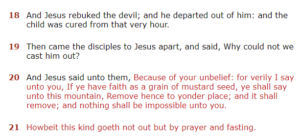The common misconception is that modern translations have “deleted” or “removed” Matthew 17:21 from the New Testament.
This charge, of course, is based on the idea that this verse must be the original, and as a result, it was removed on purpose.
It has been brought to the attention of contemporary translators that this particular line is not included in our earliest manuscripts. Meanwhile, it should be known that this verse is readily available in the King James version of the Bible, although the same cannot be said for other versions.
See a screenshot of the book in St James Version Below

See a screenshot of the absence of the book in NIV Below. Many other versions do not have the verse also.

Deleting Matthew 17:21 from certain editions of the Bible is one of the most contentious issues believers have to discuss.
Matthew 17:21 is the passage that recalls the statement that Jesus made to His followers after they had been unsuccessful in curing an epileptic youngster.
Jesus told them after successfully and easily healing him, “However, this kind does not go out except by prayer and fasting.”
But this Bible verse is not in several Bible versions like the New International Version (NIV), New Revised Standard Version (NRSV), English Standard Version (ESV), New American Standard Bible (NASB), New Living Translation (NLT), etc.
There needs to be more evidence to demonstrate that the verse is an original component of Matthew’s narrative, only to point out that the King James Version (KJV) contains the verse while many later versions do not.
There is a possibility that modern translators have not omitted the poem; rather, it is possible that Scribes inserted the words, and the translators of the King James Version (who only had access to the text of a few late manuscripts) maintained the words that were inserted without being aware of it.
If you require a new viewpoint and extensive explanation about removing Matthew 17:21. In that case, this article will provide insight. Let’s take a look at the facts before concluding on the two reasons.
READ ALSO: Biblical Meaning of Black and White Feather
Contents
The Exclusion of Matthew 17:21 in Some Bible Versions; Why?
The manuscripts that do not have it are generally considered older and more reliable. Hence, some modern Bible translations omit this verse.
However, some Bible translations, such as the King James and the New King James Version, include Matthew 17:21 since they are based on manuscripts with them.
It’s also worth noting that Matthew 17:21 is remarkably similar to Mark 9:29, which is included in all major versions of the Bible. Mark 9:29 reads, “This kind can come out by nothing but prayer and fasting.”
Matthew 17:21 is not recorded in several of the oldest and most reputable Greek manuscripts, including Codex Vaticanus and Codex Sinaiticus.
These manuscripts date back to the 4th century. Scholars consider them to be some of the most valuable witnesses to the original text of the New Testament.
Other early manuscripts that do not contain Matthew 17:21 include Codex Bezae, Codex Washingtonianus, and various early Syriac and Coptic translations of the New Testament.
Matthew 17 21 Missing. However, it’s worth noting that while some of the oldest manuscripts do not have this verse, it is found in most Greek manuscripts and is also attested in early church fathers’ writings.
Christian scholars seem to have a distinct perspective by employing historical and other grounds to support the deletion of Matthew 17:21 from the Bible. The following are some of the reasons:
Was It Skipped Purposely?
One probable reason for deleting Matthew 17:21 in some Bible versions is that scribes may have unintentionally or purposely skipped while copying the manuscripts.
The manuscript tradition of the Bible includes several generations of copying, and errors are not uncommon to emerge in the process.
For example, a scribe may have accidentally skipped over the verse when writing the text or purposely left it out because they found it difficult to understand or thought it was redundant with other sections in the Gospels.
Some academics have claimed that the deletion of Matthew 17:21 may have been a purposeful editorial decision by some early Christian communities.
These societies may have decided that the poem did not suit their particular theological or ethical ideas and, hence, elected to omit it from their manuscripts.
It’s also likely that the deletion of Matthew 17:21 in various Bible versions is merely the product of the diverse textual traditions and translation philosophies that underlie different Bible versions.
Some translations favor using some manuscripts above others, while others prioritize readability or other reasons.
To Get Rid of Contradictions?
Scholars say Matthew left verse 21 out on purpose to eliminate discrepancies. The passage is regarded to be about faith, not prayer and fasting.
The addition of these two spiritual conceptions is supposed to make Jesus’ teaching not fit with the topic of discourse, which was healing the epileptic boy.
Considering the Bible verse, academics conclude that Jesus could not have suggested fasting because the matter demanded urgency.
Jesus, our greatest example, drove out devils and raised the dead without taking a few hours’ break to fast and pray. 
Does The Deletion of Matthew 17:21 Downplay The Bible’s Credibility?
The absence of Matthew 17:21 in various current Bible translations does not always mean that the entire Bible is not believable.
The Bible is a compilation of ancient texts transmitted through numerous manuscripts and translations over thousands of years.
Differences in manuscript evidence and textual variants are prevalent in analyzing ancient texts, including the Bible.
Scholars and translators of the Bible utilize rigorous procedures to recreate the most accurate and reliable text possible based on the existing textual evidence.
Deleting a particular passage, like Matthew 17:21, is often based on the opinion that the verse should be included in the earliest and most credible manuscripts.
It does not suggest that the Bible as a whole lacks credibility. We must approach the Bible by faith, not imperfect experts’ activity.
We obtain salvation and God’s promises via faith. Therefore, we must put our faith to use when studying the Scripture.
READ ALSO: A Biblical Reference To Itching on The Right-Hand
Final Words
We must also trust the advice of the Holy Spirit, whom Jesus stated is our teacher and advocate. Remembering that many core Bible teachings, tales, and messages stay similar throughout numerous translations and manuscripts is crucial.
While textual variants and omissions exist, they often belong to specific verses or passages and do not necessarily alter the Bible’s basic ideas and core teachings. The lack of Matthew 17:21 in some of the earliest and most credible manuscripts supports this theory.
However, it’s crucial to highlight that the deletion of Matthew 17:21 in some Bible editions is not simply due to its similarities with Mark 9:29.
Deleting certain verses or chapters from a given Bible version is usually based on a mix of criteria, including manuscript evidence, scholarly examination of the original text, and translation philosophy.

